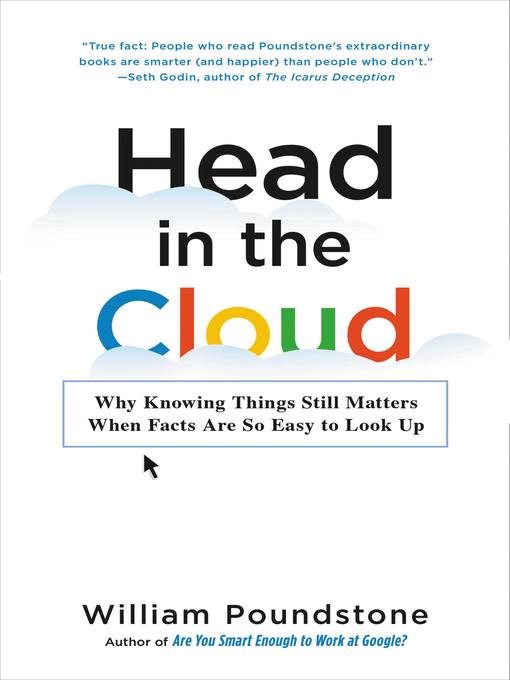
Head in the Cloud
Why Knowing Things Still Matters When Facts Are So Easy to Look Up
کتاب های مرتبط
- اطلاعات
- نقد و بررسی
- دیدگاه کاربران
نقد و بررسی

May 15, 2016
The story of the dumbing-down of the American brain, as we have all become increasingly dependent on letting our computers think for us.This breezy, pop-research overview of the decline of basic knowledge in the age of information overdrive could provide plenty of nuggets for journalists and hand-wringers over how many more millennials are familiar with the Kardashians than Descartes and can't name a single South American novelist or locate most African countries on a map. So what? Whatever we need to know, we can Google, right? While Poundstone (Rock Breaks Scissors: A Practical Guide to Outguessing and Outwitting Almost Everybody, 2014, etc.) is careful not to confuse correlation with causation, he suggests that, where general knowledge is concerned, "high scores correlate with high income, good health, and sometimes other positive attributes" (including happiness, in some studies). In a voting democracy, it's sad to note that little more than a third of Americans can name the three branches of government and that some of those with the strongest reservations about immigration, global warming, or evolution are among the least knowledgeable in general. However, Poundstone's primary tone is less alarmist than amusing, since it's clear that he's including all of us among those who could stand to know more than we do. As he heads one section, "True or False: You and Everyone You Know Are Idiots." Some of the author's ways of determining knowledge or lack thereof can seem, as he describes some of his results, "arbitrary and puzzling." For example, one chapter seems to equate knowledge with recognizing historical portraits and says that it's quite possible that those who don't recognize a photo of Bach ("about half of the American public") might well be familiar with his music. (Though perhaps it's more remarkable that even half of Americans surveyed recognize a photo of Bach.) The book reads like an extended game of Trivial Pursuit, featuring some who play very well and many more who play very poorly.
COPYRIGHT(2016) Kirkus Reviews, ALL RIGHTS RESERVED.

June 1, 2016
Poundstone's (Are You Smart Enough To Work at Google?) newest title centers on the hypothesis that knowing more is more beneficial than simply asking the Internet for answers. Conducting surveys on a variety of topics, the author offers some startling results. People on the whole regardless of factors such as gender or political leanings would be well served retaining a bit more seemingly useless information; this assertion appears to correlate not only with greater income levels but also feelings of satisfaction. Divided into three segments, the book begins with explaining the Dunning-Kruger effect (ignorance of our own ignorance), then moves onto survey results, and concludes with a convincing argument for accumulating facts. Ultimately, learning nuggets of wisdom that may not serve an immediate purpose could be well worth the long-term rewards. Despite covering a touchy subject, the narrative never gets personal. Aiming for the benefit of humanity as a whole, Poundstone's book merely wishes enlightenment--"the only thing you can't Google is what you ought to be looking up." VERDICT This title is easily digestible and not jargon-heavy; if somewhat depressing, it is also inspiring. A worthwhile read for anyone, especially those looking to get a leg up.--Kaitlin Malixi, formerly at Virginia Beach P.L.
Copyright 2016 Library Journal, LLC Used with permission.

























دیدگاه کاربران